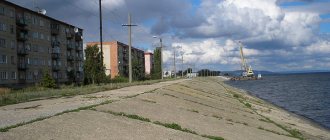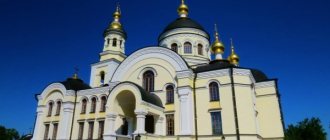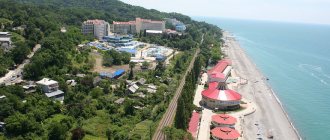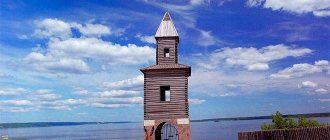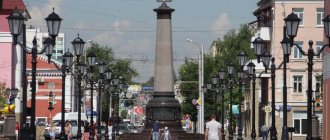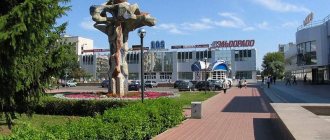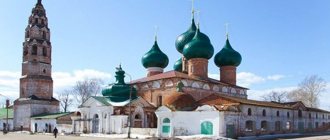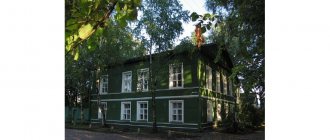Verkhoturye is a small Ural town with a population of just over 8,000 people. This is a place with a rich history. People come here to visit the smallest Kremlin in Russia, which is also the only one in the Urals, and to admire the ancient domes and church domes - the first Ural monasteries have been preserved in the city.
Verkhoturye is called the Ural Suzdal and the spiritual center of the Urals - there is something to see here for lovers of architecture and antiquity, and for pilgrims who come from afar to venerate the relics of St. Simeon of Verkhoturye. The founding of the city in 1598 is associated with the development of the Urals and Siberia. The new fortress was erected on the newly opened Babinovskaya road - a short route from Solikamsk to Siberia. The fortress built on the site of the Vogul town of Neromkur was called the “gateway to Siberia” and a customs house was installed through which all the riches of the new lands were transported.
Story
Coat of arms (1783)
Founded in 1598 by the state expedition of Vasily Golovin and Ivan Voeikov as a fort on the site of the previously existing Mansi settlement of Neromkar to protect one of the main waterways to Siberia: up the Kama to Solikamsk, then overland, and then down the Tura to the Ob . Verkhoturye became the main fortress on the way to Siberia. In 1600, a customs house was established, and all Siberian goods passed through the city.
Since the 17th century, a state yam service was established on the Babinovskaya road. The construction of other roads was prohibited. By decree of Peter I in 1708, the state was divided into 8 provinces, the city of Verkhoturye became part of the Siberian province. In 1710, 84 captured Swedes (including 5 pastors) arrived in Verkhoturye.
Verkhoturye in the 2nd half. XVIII century
The city was badly damaged by fires in 1674 and 1738, and its development slowed down in the mid-18th century due to the abolition of customs and the closure of the Verkhotursky tract in 1763.
When the provinces were established, it was a district town in the Siberian province. It was the largest district in Russia - it included almost the entire part of the Urals inhabited by Russians by that time, from Pechora in the north to Ufa in the south, from Vishera and Chusovaya in the west to the tributaries of the Irtysh in the east. In 1783 the city was transferred to the Perm governorate.
In the 19th century, communication routes with Siberia shifted far to the south, and Verkhoturye also lost its commercial importance.
In 1906, traffic opened on the Bogoslovskaya Railway, the station of which was built 8 km from the city.
After the revolution of 1917, the Bolsheviks took power in the city, and from September 1918 to July 1919 Verkhoturye was under the control of Kolchak’s army. In 1926, Verkhoturye lost its city status, which was returned to it only in 1947, in connection with the 350th anniversary of its founding.
Verkhoturye is both the oldest and the smallest city in the Sverdlovsk region.
On February 1, 1963, the city of Verkhoturye was included in the Verkhoturye rural district.
Historical views of Verkhoturye
- Verkhoturye 1910 LOC prok 02108.jpg
View of the Intercession Monastery
- Verkhoturskii Monastery 1910 LOC prok 02099.jpg
View of the Nikolaevsky Monastery
- Verkhoturye Troitskii Cathedral 1910 LOC prok 02110.jpg
Holy Trinity Cathedral
- Church of the Resurrection in Verkhoturye. Photo by Prokudin-Gorsky S.M..jpg
Church of the Resurrection of Christ
- Intercession Monastery in Verkhoturye. Pokhodyashinskaya Church.jpg
Pokrovsky Monastery. Pokhodyashinskaya (left) and Intercession churches
- Vergaturia end 17th century.jpg
Verkhoturye at the end of the 17th century. Engraving
Transport
The Goroblagodatskaya-Serov-Priobye railway passes through the city. Within the city (Privokzalny village, 7 km west of the center) there is a station: Verkhoturye and ost. point 101 km, located 3 km to the south. Suburban service with Nizhny Tagil and Serov and long-distance passenger service with Yekaterinburg, Moscow and the Ob region. Special electric trains also run to transport pilgrims, scheduled for the most important Orthodox holidays.
City transport is represented by four bus routes: 4, 5, 6, 109.
Notes
- [ystav.com/ni-kto-ne-zhelaet-byt—siti-menedzherom-verhoturya Nobody wants to be the city manager of Verkhoturya – Ystav.com]
- ↑ 12
www.gks.ru/free_doc/doc_2016/bul_dr/mun_obr2016.rar Population of the Russian Federation by municipalities as of January 1, 2016 - It had the status of a city from the moment of its foundation, in 1926 it became a rural settlement and in 1947 it received the status of a city for the second time.
- Chagin G. “Just don’t kill the Swedes...” // Rodina. - 2009. - No. 12. - P. 111
- ↑ 123456789101112
[www.MojGorod.ru/sverdlov_obl/verhoturje/index.html People's encyclopedia “My City”. Verkhoturye]. Retrieved June 24, 2014. [www.webcitation.org6QZ3076Mi/ Archived from the original on June 24, 2014]. - [demoscope.ru/weekly/ssp/rus59_reg2.php All-Union Population Census of 1959. The size of the urban population of the RSFSR, its territorial units, urban settlements and urban areas by gender] (Russian). Demoscope Weekly. Retrieved September 25, 2013. [www.webcitation.org/6GDOghWC9 Archived from the original on April 28, 2013].
- [demoscope.ru/weekly/ssp/rus70_reg2.php All-Union Population Census of 1970 The size of the urban population of the RSFSR, its territorial units, urban settlements and urban areas by gender.] (Russian). Demoscope Weekly. Retrieved September 25, 2013. [www.webcitation.org/6GDOiMstp Archived from the original on April 28, 2013].
- [demoscope.ru/weekly/ssp/rus79_reg2.php All-Union Population Census of 1979 The size of the urban population of the RSFSR, its territorial units, urban settlements and urban areas by gender.] (Russian). Demoscope Weekly. Retrieved September 25, 2013. [www.webcitation.org/6GDOjhZ5L Archived from the original on April 28, 2013].
- [demoscope.ru/weekly/ssp/rus89_reg2.php All-Union Population Census of 1989. Urban population]. [www.webcitation.org/617x0o0Pa Archived from the original on August 22, 2011].
- [www.perepis2002.ru/ct/doc/1_TOM_01_04.xls All-Russian Population Census 2002. Volume. 1, table 4. Population of Russia, federal districts, constituent entities of the Russian Federation, districts, urban settlements, rural settlements - regional centers and rural settlements with a population of 3 thousand or more]. [www.webcitation.org/65AdCU0q3 Archived from the original on February 3, 2012].
- [www.gks.ru/bgd/regl/b08_14t/IssWWW.exe/Stg/ur/03-00.htm Administrative-territorial division of the Sverdlovsk region as of January 1, 2008]. Retrieved May 11, 2016. [www.webcitation.org/6hQQf5WLh Archived from the original on May 11, 2016].
- [www.gks.ru/bgd/regl/B09_109/IssWWW.exe/Stg/d01/tabl-21-09.xls Number of permanent population of the Russian Federation by cities, urban-type settlements and districts as of January 1, 2009]. Retrieved January 2, 2014. [www.webcitation.org/6MJmu0z1u Archived from the original on January 2, 2014].
- [sverdl.gks.ru/wps/wcm/connect/rosstat_ts/sverdl/resources/c081bf004cb2e2e8b07efb98f842dd0b/number and distribution of the population of the Sverdlovsk region.rar All-Russian population census 2010. Number and distribution of the population of the Sverdlovsk region]. Retrieved June 1, 2014. [www.webcitation.org/6Q0e0rzaI Archived from the original on June 1, 2014].
- [www.gks.ru/free_doc/doc_2012/bul_dr/mun_obr2012.rar Population of the Russian Federation by municipalities. Table 35. Estimated resident population as of January 1, 2012]. Retrieved May 31, 2014. [www.webcitation.org/6PyOWbdMc Archived from the original on May 31, 2014].
- [www.gks.ru/free_doc/doc_2013/bul_dr/mun_obr2013.rar Population of the Russian Federation by municipalities as of January 1, 2013. - M.: Federal State Statistics Service Rosstat, 2013. - 528 p. (Table 33. Population of urban districts, municipal districts, urban and rural settlements, urban settlements, rural settlements)]. Retrieved November 16, 2013. [www.webcitation.org/6LAdCWSxH Archived from the original on November 16, 2013].
- [www.gks.ru/free_doc/doc_2014/bul_dr/mun_obr2014.rar Table 33. Population of the Russian Federation by municipalities as of January 1, 2014]. Retrieved August 2, 2014. [www.webcitation.org/6RWqP50QK Archived from the original on August 2, 2014].
- [www.gks.ru/free_doc/doc_2015/bul_dr/mun_obr2015.rar Population of the Russian Federation by municipalities as of January 1, 2015]. Retrieved August 6, 2015. [www.webcitation.org/6aaNzOlFO Archived from the original on August 6, 2015].
- taking into account the cities of Crimea
- [www.gks.ru/free_doc/doc_2016/bul_dr/mun_obr2016.rar Population of the Russian Federation by municipalities as of January 1, 2016. Table “31. Population of cities and towns by federal districts and constituent entities of the Russian Federation as of January 1, 2016.” RAR archive (1.0 MB)]
- Vedomosti, No. 186 (1713), October 4, 2006
- [www.tv-soyuz.ru/videonews/allvideos/10-diocesanlife/28310-gotovyatsya-k-osvyascheniyu-pridelyi-krestovozdvijenskogo-sobora-verhoturya The chapel of the Holy Cross Cathedral in Verkhoturye is being prepared for the consecration]
- “Encyclopedic Dictionary of Young Technicians” Moscow “Pedagogy”, 1988, p.61
Attractions
- Verkhoturye State Historical and Architectural Museum-Reserve;
- Orthodox Museum;
- Cinema "Mayak" in the leisure center and square;
- House of folk arts and crafts.
Nikolaevsky Monastery
Founded in 1604.
- The Cathedral of the Exaltation of the Cross (1905-1913, architect Alexander Turchevich) is the third largest church in Russia, second only to the Cathedral of Christ the Savior in Moscow and St. Isaac's Cathedral in St. Petersburg.
- Church of the Transfiguration (1821) in the classicist style with a bell tower, destroyed in the 1930s and restored in 1998.
- Simeon-Anninskaya Gate Church (1856) in the traditions of ancient Russian architecture.
- Holy Cross Cathedral
- Transfiguration Church
- Gate Church of Simeon and Anna
- Western wall of the Nicholas Monastery in Verkhoturye
- Verkhoturye Nikolaevsky Monastery
Pokrovsky Monastery
- Founded in 1621 by Archbishop Cyprian of Siberia, it was the first convent beyond the Urals. The churches of the Intercession of the Virgin Mary (1744-1753) and the Nativity of John the Baptist (1768) were built at the expense of Maxim Pokhodyashin.
- Abolished in 1782.
- Renewed in 1896. Due to the fact that the churches that previously belonged to the monastery were parish churches by that time, the New Intercession Church was built in 1898-1902.
- Closed in 1926.
- Returned to believers in 1991.
- View of the Intercession Monastery from behind Tura
- Church of the Intercession of the Virgin. Old
- Church of the Intercession of the Virgin. New
- Church of John the Baptist
Kremlin. Trinity Cathedral
- Trinity Cathedral. Built in 1703-1709. In 1777, a clock was installed on the bell tower.
- The Verkhoturye Kremlin was built in stone from 1699 to 1712. This is the only Kremlin in the Middle Urals, the youngest and smallest Kremlin in Russia.
- Trinity Cathedral
- North Gate
- View of Tura and Trinity Stone
- View from Trinity Stone down the Tura
Parish churches
- Church of the Resurrection of Christ
- Church of the Mother of God of the Sign
- House for honored guests
50 km from Verkhoturye, in the village of Merkushino, the holy righteous Simeon of Verkhoturye of All Siberia, the wonderworker and patron of fishermen, labored. The relics of the saint rest in the Cathedral of the Exaltation of the Cross. The lives of Saints Cosmas and Arethas of Verkhoturye are also connected with Verkhoturye.
The city is home to the Verkhoturye Historical and Architectural Museum-Reserve and the Orthodox Museum. The civil (stone and wooden) buildings of the city are also of interest.
There is a persistent legend (not confirmed, however, by any historical document) that the first bicycle with pedals and a steering wheel was built in Verkhoturye by the serf blacksmith Efim Artamonov. According to this legend, on September 15, 1801, thousands of people gathered on Khodynskoye Field in Moscow watched in amazement at an amazing two-wheeled cart. According to legend, it was added to the royal collection of rarities. A model of this bicycle (actually copied at the end of the 19th century from English bicycles of that time) is kept in the Nizhny Tagil Museum of Local Lore.
Monuments
- Monument on the station square
- Monument at the walls of the Nicholas Monastery
- Tractor-monument
- Monument to teachers and graduates of high school
Economy
Although there are wood processing enterprises in the city, Verkhoturye’s budget is essentially subsidized.
The tourism industry is developing, mainly associated with visiting Orthodox shrines and small retail trade. The Verkhoturskaya hydroelectric power station has a capacity of 7 MW and an average annual output of 33 million kWh.
Due to the fact that the main oil pipelines Surgut - Polotsk, Kholmogory - Klin pass near Verkhoturye, it is planned to build an oil refinery in the city area with a capacity of 3 million tons of oil per year and a cost of $1.4 billion[20].
Verkhoturye is the center of Orthodoxy in the Urals, one of the oldest cities in Russia beyond the Ural Mountains. The city has many architectural monuments of the 17th-20th centuries. Among them are the smallest Kremlin in Russia with the Trinity Cathedral (1703-1712), the Nikolaevsky Monastery, and the Pokrovsky Monastery.
Content
- 1. History
- 2 Geography and climate
- 3 Population
- 4 Economics
- 5 Transport
- 6 Attractions 6.1 City cultural institutions
- 6.2 Architectural monuments of the city
- 7.1 Nikolaevsky Monastery
- 9.1 Voivodes
Attractions[ | ]
City cultural institutions[ | ]
- Verkhoturye State Historical and Architectural Museum-Reserve;
- Museum of Folk Arts and Crafts;
- Verkhoturye Orthodox Museum;
- The Real School is an architectural ensemble of the early 20th century;
- Cinema "Mayak" in the city leisure center and square;
- Park of culture and recreation.
- Stone bridge in Verkhoturye
- Park on Senyanskaya street. with water tower
Architectural monuments of the city[ | ]
House for honored guests
- Balashov's House
- House with a tea shop
- House of Honored Guests
- Apartment house
- Veterinary hospital
- Women's gymnasium
- Zemsky hospital
- Public meeting building
- Arefiev Estate
- Ragozin's estate
- House on the street Lenina, 1
- House on the street K. Marx, 2
- The building of the Verkhoturye women's gymnasium
- The building of the Verkhoturye state wine warehouse
Population[ | ]
| Population | |||||||||
| 1856[7] | 1897[7] | 1959[8] | 1970[9] | 1979[10] | 1989[11] | 1992[7] | 1996[7] | 1998[7] | 2000[7] |
| 3000 | ↗3200 | ↗10 917 | ↘9688 | ↘8966 | ↗8973 | ↗9000 | ↘8700 | ↘8500 | ↘8400 |
| 2001[7] | 2002[12] | 2003[7] | 2005[7] | 2006[7] | 2007[7] | 2008[13] | 2009[14] | 2010[15] | 2011[7] |
| ↘8300 | ↘7815 | ↘7800 | ↘7600 | ↘7500 | ↘7400 | →7400 | ↘7398 | ↗8820 | ↘8800 |
| 2012[16] | 2013[17] | 2014[18] | 2015[19] | 2016[20] | 2017[21] | 2018[22] | 2019[23] | 2020[24] | 2021[2] |
| ↗8809 | ↘8776 | ↘8771 | ↘8748 | ↘8678 | ↘8651 | ↘8612 | ↘8593 | ↘8563 | ↘8525 |
As of January 1, 2022, in terms of population, the city was in 974th place out of 1116[25]cities of the Russian Federation[26].
Geography and climate[ | ]
Located on the left bank of the Tura River (tributary of the Tobol, Irtysh basin), on the eastern slopes of the Middle Urals, 306 km north of Yekaterinburg.
The small rivers Mostovaya and Kalachik flow through the city. 13 km to the northeast is the Otvinskoye swamp, 15 km to the northeast is the Stupinskoye swamp, 33 km to the northeast is the Drunken swamp.
The climate is temperate continental.
Climate of Verkhoturye (norm 1981–2010)
| Index | Jan. | Feb. | March | Apr. | May | June | July | Aug. | Sep. | Oct. | Nov. | Dec. | Year |
| Average temperature, °C | −15,5 | −13,5 | −4,8 | 2,8 | 9,9 | 16,0 | 18,1 | 14,7 | 8,7 | 2,3 | −7,8 | −13,2 | 1,5 |
| Precipitation rate | 30 | 20 | 22 | 31 | 52 | 67 | 93 | 88 | 70 | 40 | 34 | 29 | 576 |
| Source: [6]. | |||||||||||||
An excerpt characterizing Verkhoturye
“Entrez, entrez,” he repeated only in a gentle whisper. “Oh, what should I do to him!” - Petya said to himself and, opening the door, let the boy pass by. When the drummer entered the hut, Petya sat away from him, considering it humiliating for himself to pay attention to him. He just felt the money in his pocket and was in doubt whether it would be a shame to give it to the drummer. From the drummer, who, on Denisov’s orders, was given vodka, mutton and whom Denisov ordered to dress in a Russian caftan, so that, without sending him away with the prisoners, he would be left with the party, Petya’s attention was diverted by the arrival of Dolokhov. Petya in the army heard many stories about the extraordinary courage and cruelty of Dolokhov with the French, and therefore, from the moment Dolokhov entered the hut, Petya, without taking his eyes off, looked at him and became more and more encouraged, twitching his head raised, so as not to be unworthy even of such a society as Dolokhov. Dolokhov’s appearance strangely struck Petya with its simplicity. Denisov dressed in a checkmen, wore a beard and on his chest the image of St. Nicholas the Wonderworker, and in his manner of speaking, in all his manners, he showed the peculiarity of his position. Dolokhov, on the contrary, previously, in Moscow, who wore a Persian suit, now had the appearance of the most prim Guards officer. His face was clean-shaven, he was dressed in a guards cotton frock coat with George in the buttonhole and a simple cap straight on. He took off his wet cloak in the corner and, going up to Denisov, without greeting anyone, immediately began asking about the matter. Denisov told him about the plans that large detachments had for their transport, and about sending Petya, and about how he responded to both generals. Then Denisov told everything he knew about the position of the French detachment. “That’s true, but you need to know what and how many troops,” said Dolokhov, “you will need to go.” Without knowing exactly how many there are, you cannot start the business. I like to do things carefully. Now, would any of the gentlemen want to go with me to their camp? I have my uniforms with me. - I, I... I will go with you! – Petya screamed. “You don’t need to go at all,” Denisov said, turning to Dolokhov, “and I won’t let him in for anything.” - That's great! - Petya cried out, - why shouldn’t I go?.. - Yes, because there is no need. “Well, excuse me, because... because... I’ll go, that’s all.” Will you take me? – he turned to Dolokhov. “Why…” answered Dolokhov absentmindedly, peering into the face of the French drummer. - How long have you had this young man? – he asked Denisov. - Today they took him, but he doesn’t know anything. I left it for myself. - Well, where are you putting the rest? - said Dolokhov. - How to where? I'm sending you under the guard! – Denisov suddenly blushed and cried out. “And I can boldly say that there is not a single person on my conscience.” Is it really right for you to send away a person under escort in a city, what to do, I will tell you, the honor of a soldier. “It’s decent for a young count of sixteen to say these pleasantries,” Dolokhov said with a cold grin, “but it’s time for you to leave it.” “Well, I’m not saying anything, I’m just saying that I will definitely go with you,” Petya said timidly. “And it’s time for you and me, brother, to give up these pleasantries,” Dolokhov continued, as if he found special pleasure in talking about this subject that irritated Denisov. - Well, why did you take this to you? - he said, shaking his head. - Then why do you feel sorry for him? After all, we know these receipts of yours. You send them a hundred people, and thirty will come. They will starve or be beaten. So is it all the same not to take them? Esaul, narrowing his bright eyes, nodded his head approvingly. - This is all shit, there’s nothing to discuss here. I don’t want to take it on my soul. You talk - pomg'ut. Well, hog'osho. Just not from me. Dolokhov laughed. “Who didn’t tell them to catch me twenty times?” But they will catch me and you, with your chivalry, anyway. – He paused. - However, we have to do something. Send my Cossack with a pack! I have two French uniforms. Well, are you coming with me? – he asked Petya. - I? Yes, yes, absolutely,” Petya cried, blushing almost to tears, looking at Denisov. Again, while Dolokhov was arguing with Denisov about what should be done with the prisoners, Petya felt awkward and hasty; but again I did not have time to fully understand what they were talking about. “If big, famous people think so, then it must be so, therefore it’s good,” he thought. “And most importantly, Denisov must not dare to think that I will obey him, that he can command me.” I will definitely go with Dolokhov to the French camp. He can do it and so can I.” To all of Denisov’s urgings not to travel, Petya replied that he, too, was used to doing everything carefully, and not Lazar’s at random, and that he never thought about danger to himself. “Because,” you yourself must agree, “if you don’t know correctly how many there are, the lives of maybe hundreds depend on it, but here we are alone, and then I really want this, and I will definitely, definitely go, you won’t stop me.” “, he said, “it will only get worse... Dressed in French greatcoats and shakos, Petya and Dolokhov drove to the clearing from which Denisov looked at the camp, and, leaving the forest in complete darkness, descended into the ravine. Having driven down, Dolokhov ordered the Cossacks accompanying him to wait here and rode at a fast trot along the road to the bridge. Petya, transfixed with excitement, rode next to him. “If we get caught, I won’t give up alive, I have a gun,” Petya whispered. “Don’t speak Russian,” Dolokhov said in a quick whisper, and at that same moment a cry was heard in the darkness: “Qui vive?” [Who's coming?] and the ringing of a gun. Blood rushed to Petya's face, and he grabbed the pistol. “Lanciers du sixieme, [Lancers of the sixth regiment.],” said Dolokhov, without shortening or increasing the horse’s stride. The black figure of a sentry stood on the bridge. – Mot d'ordre? [Feedback?] – Dolokhov held his horse and rode at a walk. – Dites donc, le colonel Gerard est ici? [Tell me, is Colonel Gerard here?] - he said. – Mot d'ordre! - Without answering, the sentry said, blocking the road. “Quand un officier fait sa ronde, les sentinelles ne demandent pas le mot d'ordre...” Dolokhov shouted, suddenly flushing, running his horse into the sentry. – Je vous demande si le colonel est ici? [When the officer goes around the chain, the sentries do not ask for feedback... I ask, is the colonel here?] And, without waiting for an answer from the guard who stood aside, Dolokhov walked up the hill at a walk. Noticing the black shadow of a man crossing the road, Dolokhov stopped this man and asked where the commander and officers were? This man, a soldier with a sack on his shoulder, stopped, came close to Dolokhov’s horse, touching it with his hand, and simply and friendlyly said that the commander and officers were higher on the mountain, on the right side, in the farm yard (that’s what he called the master’s estate). Having driven along the road, on both sides of which French conversation could be heard from the fires, Dolokhov turned into the courtyard of the manor’s house. Having passed through the gate, he dismounted from his horse and approached a large blazing fire, around which several people were sitting, talking loudly. Something was boiling in a pot on the edge, and a soldier in a cap and blue overcoat, kneeling, brightly illuminated by the fire, stirred it with a ramrod. “Oh, c'est un dur a cuire, [You can’t deal with this devil.]” said one of the officers sitting in the shadows on the opposite side of the fire. “Il les fera marcher les lapins... [He will get through them...],” said another with a laugh. Both fell silent, peering into the darkness at the sound of the steps of Dolokhov and Petya, approaching the fire with their horses. - Bonjour, messieurs! [Hello, gentlemen!] - Dolokhov said loudly and clearly. The officers stirred in the shadow of the fire, and one, a tall officer with a long neck, walked around the fire and approached Dolokhov. – C'est vous, Clement? - he said. – D'ou, diable... [Is that you, Clément? Where the hell...] - but he didn’t finish, having learned his mistake, and, frowning slightly, as if he were a stranger, he greeted Dolokhov, asking him how he could serve. Dolokhov said that he and a friend were catching up with their regiment, and asked, turning to everyone in general, if the officers knew anything about the sixth regiment. Nobody knew anything; and it seemed to Petya that the officers began to examine him and Dolokhov with hostility and suspicion. Everyone was silent for a few seconds. “Si vous comptez sur la soupe du soir, vous venez trop tard, [If you are counting on dinner, then you are late.],” said a voice from behind the fire with a restrained laugh. Dolokhov replied that they were full and that they needed to move on at night. He gave the horses to the soldier who was stirring the pot, and squatted down by the fire next to the long-necked officer. This officer, without taking his eyes off, looked at Dolokhov and asked him again: what regiment was he in? Dolokhov did not answer, as if he had not heard the question, and, lighting a short French pipe, which he took out of his pocket, asked the officers how safe the road was from the Cossacks ahead of them. “Les brigands sont partout, [These robbers are everywhere.],” answered the officer from behind the fire. Dolokhov said that the Cossacks were terrible only for such backward people as he and his comrade, but that the Cossacks probably did not dare to attack large detachments, he added questioningly. Nobody answered. “Well, now he’ll leave,” Petya thought every minute, standing in front of the fire and listening to his conversation. But Dolokhov again began the conversation that had stopped and directly began asking how many people they had in the battalion, how many battalions, how many prisoners. Asking about the Russian prisoners who were with their detachment, Dolokhov said: “La vilaine affaire de trainer ces cadavres apres soi.” Vaudrait mieux fusiller cette canaille, [It’s a bad thing to drag these corpses around with you. It would be better to shoot this bastard.] - and laughed loudly with such a strange laugh that Petya thought the French would now recognize the deception, and he involuntarily took a step away from the fire. No one responded to Dolokhov’s words and laughter, and the French officer, who was not visible (he was lying wrapped in an overcoat), stood up and whispered something to his comrade. Dolokhov stood up and called to the soldier with the horses. “Will they serve the horses or not?” - Petya thought, involuntarily approaching Dolokhov. The horses were brought in. “Bonjour, messieurs, [Here: farewell, gentlemen.],” said Dolokhov. Petya wanted to say bonsoir [good evening] and could not finish the words. The officers were whispering something to each other. Dolokhov took a long time to mount the horse, which was not standing; then he walked out of the gate. Petya rode beside him, wanting and not daring to look back to see whether the French were running or not running after them. Having reached the road, Dolokhov drove not back into the field, but along the village. At one point he stopped, listening. - Do you hear? - he said. Petya recognized the sounds of Russian voices and saw the dark figures of Russian prisoners near the fires. Going down to the bridge, Petya and Dolokhov passed the sentry, who, without saying a word, walked gloomily along the bridge, and drove out into the ravine where the Cossacks were waiting. - Well, goodbye now. Tell Denisov that at dawn, at the first shot,” said Dolokhov and wanted to go, but Petya grabbed him with his hand. - No! - he cried, - you are such a hero. Oh, how good! How great! How I love you. “Okay, okay,” said Dolokhov, but Petya did not let him go, and in the darkness Dolokhov saw that Petya was bending down towards him. He wanted to kiss. Dolokhov kissed him, laughed and, turning his horse, disappeared into the darkness. X Returning to the guardhouse, Petya found Denisov in the entryway. Denisov, in excitement, anxiety and annoyance at himself for letting Petya go, was waiting for him. - God bless! - he shouted. - Well, thank God! - he repeated, listening to Petya’s enthusiastic story. - Why don’t I sleep because of you! - Denisov said. - Well, thank God, go to bed now. We'll rise again until the end. “Yes... No,” said Petya. – I don’t want to sleep yet. Yes, I know myself, if I fall asleep, it’s over. And then I got used to not sleeping before the battle. Petya sat for some time in the hut, joyfully recalling the details of his trip and vividly imagining what would happen tomorrow. Then, noticing that Denisov had fallen asleep, he got up and went into the yard.
